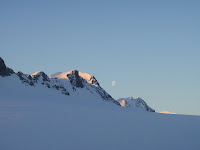For example:
We don't see the moon very often, so when we do we take photos of it;

I go to bed at any time and it is as bright as when I got up that morning;
when I get up I have to dig my way out of the accommodation block to go for breakfast;
at breakfast I could be sitting next to a doctor and a mountaineer, at lunch I could be sitting next to a pilot and a plumber and at dinner I could be sitting next to an ecobiogeochemist (???!!!) and a diver. It's not everyone who can claim to have good friends from such a diverse range of backgrounds.
After b
 reakfast I make my way across the base to my workshop, where I have to dig my way in. Once inside I find that I cannot see out of my window because of the snow at the rear of the building!
reakfast I make my way across the base to my workshop, where I have to dig my way in. Once inside I find that I cannot see out of my window because of the snow at the rear of the building!Another thing that is different to the UK: making deliveries of equipment to the beakers out in the field.
Now, I've made lots of delivery runs in my time, but none like this. We had to deliver a skidoo and some scientific equipment to a field party out on the Larsen Ice Shelf.
Back home the accepted mode of transport is the van.
Not here...oh no! Here we use a Twin Otter!

Back home I've been the driver's assistant/mate. Here I'm the co-pilot!! I flew with Doug Pearson, one of BAS's most experienced pilots. This is his sixteenth season in Antarctica.
It was only a short flight (just under two hours) but it gave such incredible views of this amazing continent. I can't begin to tell you how exciting that flight was.
The drop-zone was only about 150-odd miles from Rothera but the scenery couldn't be more different. In fact, at the Larsen there is no scenery at all. It is totally flat for as far as the eye can see.
I did a full 360degree turn and all I could see was the plane that I arrived in!!! It was the most fantastic view of absolutely nothing that I have ever had!!
After dropping off the equipment we had to make the return flight; more breathtaking views and jaw-dropping moments.
Just as we were coming into land I remembered that I could take video on my little camera. I've included it here for your pleasure.
I shall be making quite a few more co-pilot trips this season. One of the flights will be to our refueling depot at Fossil Bluff. I shall have to spend a few days there, checking out and repairing the cabin and equipment that's there. I'm looking forward to that trip.
Another normal thing here is the wildlife, and I don't mean all the hairy wierdy- beardy people that roam freely around the base.
 My favourites (and everyone else's, I think) are most definitely the penguins. They are soooo addictive. You can never EVER tire of getting up close and personal with penguins.
My favourites (and everyone else's, I think) are most definitely the penguins. They are soooo addictive. You can never EVER tire of getting up close and personal with penguins.The most common penguins around Rothera are the Adelie penguins, but this week I was fortunate enough to see a Chinstrap penguin. Chinstraps
 don't come around here very often so I was pleased that I got to see one up close.
don't come around here very often so I was pleased that I got to see one up close.As is usual for penguins, he was quite happy to pose for my camera. It's almost as if they know what they are doing.

I Also met Bubba the base head Skua again this week. Where else in the world can you have a tame sausage-eating Antarctic Skua wander into your aircraft hanger for a free feed? Is this normal in your life?

We don't always have howling winds and blizzards here. Sometimes we get a few hours of sunshine and good weather. That's when you see the awesome beauty of Antarctica.

However, when it snows we have to dig!!!
We use shovels for doorways and windows, and bulldozers for access ways.
 And we get the sun at midnight!!
And we get the sun at midnight!!I've been here four weeks now and I've taken over eight hundred photos.
This is my favourite one so far. It was taken facing south over the wharf. In reality it is bright daylight, but somehow I got this effect by fluke. The sun dips towards the horizon, but doesn't disappear.
In six months time we won't have any sunlight at all.
But down here in Antarctica, this is "normal".
